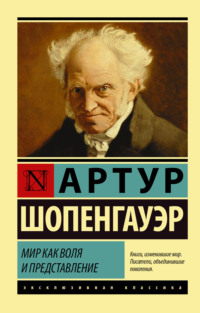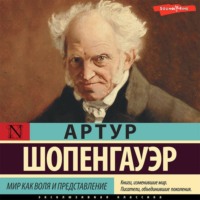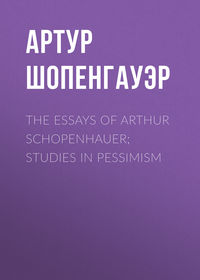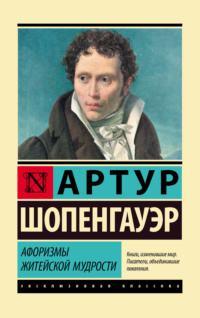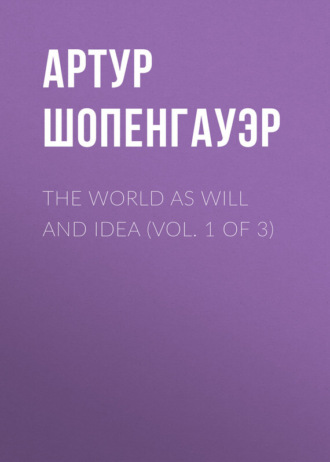 полная версия
полная версияThe World as Will and Idea (Vol. 1 of 3)
(Ut enim cuique complexio membrorum flexibilium se habet, ita mens hominibus adest: idem namque est, quod sapit, membrorum natura hominibus, et omnibus et omni: quod enim plus est, intelligentia est.)30
§ 21. Whoever has now gained from all these expositions a knowledge in abstracto, and therefore clear and certain, of what every one knows directly in concreto, i. e., as feeling, a knowledge that his will is the real inner nature of his phenomenal being, which manifests itself to him as idea, both in his actions and in their permanent substratum, his body, and that his will is that which is most immediate in his consciousness, though it has not as such completely passed into the form of idea in which object and subject stand over against each other, but makes itself known to him in a direct manner, in which he does not quite clearly distinguish subject and object, yet is not known as a whole to the individual himself, but only in its particular acts, – whoever, I say, has with me gained this conviction will find that of itself it affords him the key to the knowledge of the inmost being of the whole of nature; for he now transfers it to all those phenomena which are not given to him, like his own phenomenal existence, both in direct and indirect knowledge, but only in the latter, thus merely one-sidedly as idea alone. He will recognise this will of which we are speaking not only in those phenomenal existences which exactly resemble his own, in men and animals as their inmost nature, but the course of reflection will lead him to recognise the force which germinates and vegetates in the plant, and indeed the force through which the crystal is formed, that by which the magnet turns to the north pole, the force whose shock he experiences from the contact of two different kinds of metals, the force which appears in the elective affinities of matter as repulsion and attraction, decomposition and combination, and, lastly, even gravitation, which acts so powerfully throughout matter, draws the stone to the earth and the earth to the sun, – all these, I say, he will recognise as different only in their phenomenal existence, but in their inner nature as identical, as that which is directly known to him so intimately and so much better than anything else, and which in its most distinct manifestation is called will. It is this application of reflection alone that prevents us from remaining any longer at the phenomenon, and leads us to the thing in itself. Phenomenal existence is idea and nothing more. All idea, of whatever kind it may be, all object, is phenomenal existence, but the will alone is a thing in itself. As such, it is throughout not idea, but toto genere different from it; it is that of which all idea, all object, is the phenomenal appearance, the visibility, the objectification. It is the inmost nature, the kernel, of every particular thing, and also of the whole. It appears in every blind force of nature and also in the preconsidered action of man; and the great difference between these two is merely in the degree of the manifestation, not in the nature of what manifests itself.
§ 22. Now, if we are to think as an object this thing-in-itself (we wish to retain the Kantian expression as a standing formula), which, as such, is never object, because all object is its mere manifestation, and therefore cannot be it itself, we must borrow for it the name and concept of an object, of something in some way objectively given, consequently of one of its own manifestations. But in order to serve as a clue for the understanding, this can be no other than the most complete of all its manifestations, i. e., the most distinct, the most developed, and directly enlightened by knowledge. Now this is the human will. It is, however, well to observe that here, at any rate, we only make use of a denominatio a potiori, through which, therefore, the concept of will receives a greater extension than it has hitherto had. Knowledge of the identical in different phenomena, and of difference in similar phenomena, is, as Plato so often remarks, a sine qua non of philosophy. But hitherto it was not recognised that every kind of active and operating force in nature is essentially identical with will, and therefore the multifarious kinds of phenomena were not seen to be merely different species of the same genus, but were treated as heterogeneous. Consequently there could be no word to denote the concept of this genus. I therefore name the genus after its most important species, the direct knowledge of which lies nearer to us and guides us to the indirect knowledge of all other species. But whoever is incapable of carrying out the required extension of the concept will remain involved in a permanent misunderstanding. For by the word will he understands only that species of it which has hitherto been exclusively denoted by it, the will which is guided by knowledge, and whose manifestation follows only upon motives, and indeed merely abstract motives, and thus takes place under the guidance of the reason. This, we have said, is only the most prominent example of the manifestation of will. We must now distinctly separate in thought the inmost essence of this manifestation which is known to us directly, and then transfer it to all the weaker, less distinct manifestations of the same nature, and thus we shall accomplish the desired extension of the concept of will. From another point of view I should be equally misunderstood by any one who should think that it is all the same in the end whether we denote this inner nature of all phenomena by the word will or by any other. This would be the case if the thing-in-itself were something whose existence we merely inferred, and thus knew indirectly and only in the abstract. Then, indeed, we might call it what we pleased; the name would stand merely as the symbol of an unknown quantity. But the word will, which, like a magic spell, discloses to us the inmost being of everything in nature, is by no means an unknown quantity, something arrived at only by inference, but is fully and immediately comprehended, and is so familiar to us that we know and understand what will is far better than anything else whatever. The concept of will has hitherto commonly been subordinated to that of force, but I reverse the matter entirely, and desire that every force in nature should be thought as will. It must not be supposed that this is mere verbal quibbling or of no consequence; rather, it is of the greatest significance and importance. For at the foundation of the concept of force, as of all other concepts, there ultimately lies the knowledge in sense-perception of the objective world, that is to say, the phenomenon, the idea; and the concept is constructed out of this. It is an abstraction from the province in which cause and effect reign, i. e., from ideas of perception, and means just the causal nature of causes at the point at which this causal nature is no further etiologically explicable, but is the necessary presupposition of all etiological explanation. The concept will, on the other hand, is of all possible concepts the only one which has its source not in the phenomenal, not in the mere idea of perception, but comes from within, and proceeds from the most immediate consciousness of each of us, in which each of us knows his own individuality, according to its nature, immediately, apart from all form, even that of subject and object, and which at the same time is this individuality, for here the subject and the object of knowledge are one. If, therefore, we refer the concept of force to that of will, we have in fact referred the less known to what is infinitely better known; indeed, to the one thing that is really immediately and fully known to us, and have very greatly extended our knowledge. If, on the contrary, we subsume the concept of will under that of force, as has hitherto always been done, we renounce the only immediate knowledge which we have of the inner nature of the world, for we allow it to disappear in a concept which is abstracted from the phenomenal, and with which we can therefore never go beyond the phenomenal.
§ 23. The will as a thing in itself is quite different from its phenomenal appearance, and entirely free from all the forms of the phenomenal, into which it first passes when it manifests itself, and which therefore only concern its objectivity, and are foreign to the will itself. Even the most universal form of all idea, that of being object for a subject, does not concern it; still less the forms which are subordinate to this and which collectively have their common expression in the principle of sufficient reason, to which we know that time and space belong, and consequently multiplicity also, which exists and is possible only through these. In this last regard I shall call time and space the principium individuationis, borrowing an expression from the old schoolmen, and I beg to draw attention to this, once for all. For it is only through the medium of time and space that what is one and the same, both according to its nature and to its concept, yet appears as different, as a multiplicity of co-existent and successive phenomena. Thus time and space are the principium individuationis, the subject of so many subtleties and disputes among the schoolmen, which may be found collected in Suarez (Disp. 5, Sect. 3). According to what has been said, the will as a thing-in-itself lies outside the province of the principle of sufficient reason in all its forms, and is consequently completely groundless, although all its manifestations are entirely subordinated to the principle of sufficient reason. Further, it is free from all multiplicity, although its manifestations in time and space are innumerable. It is itself one, though not in the sense in which an object is one, for the unity of an object can only be known in opposition to a possible multiplicity; nor yet in the sense in which a concept is one, for the unity of a concept originates only in abstraction from a multiplicity; but it is one as that which lies outside time and space, the principium individuationis, i. e., the possibility of multiplicity. Only when all this has become quite clear to us through the subsequent examination of the phenomena and different manifestations of the will, shall we fully understand the meaning of the Kantian doctrine that time, space and causality do not belong to the thing-in-itself, but are only forms of knowing.
The uncaused nature of will has been actually recognised, where it manifests itself most distinctly, as the will of man, and this has been called free, independent. But on account of the uncaused nature of the will itself, the necessity to which its manifestation is everywhere subjected has been overlooked, and actions are treated as free, which they are not. For every individual action follows with strict necessity from the effect of the motive upon the character. All necessity is, as we have already said, the relation of the consequent to the reason, and nothing more. The principle of sufficient reason is the universal form of all phenomena, and man in his action must be subordinated to it like every other phenomenon. But because in self-consciousness the will is known directly and in itself, in this consciousness lies also the consciousness of freedom. The fact is, however, overlooked that the individual, the person, is not will as a thing-in-itself, but is a phenomenon of will, is already determined as such, and has come under the form of the phenomenal, the principle of sufficient reason. Hence arises the strange fact that every one believes himself a priori to be perfectly free, even in his individual actions, and thinks that at every moment he can commence another manner of life, which just means that he can become another person. But a posteriori, through experience, he finds to his astonishment that he is not free, but subjected to necessity; that in spite of all his resolutions and reflections he does not change his conduct, and that from the beginning of his life to the end of it, he must carry out the very character which he himself condemns, and as it were play the part he has undertaken to the end. I cannot pursue this subject further at present, for it belongs, as ethical, to another part of this work. In the meantime, I only wish to point out here that the phenomenon of the will which in itself is uncaused, is yet as such subordinated to the law of necessity, that is, the principle of sufficient reason, so that in the necessity with which the phenomena of nature follow each other, we may find nothing to hinder us from recognising in them the manifestations of will.
Only those changes which have no other ground than a motive, i. e., an idea, have hitherto been regarded as manifestations of will. Therefore in nature a will has only been attributed to man, or at the most to animals; for knowledge, the idea, is of course, as I have said elsewhere, the true and exclusive characteristic of animal life. But that the will is also active where no knowledge guides it, we see at once in the instinct and the mechanical skill of animals.31 That they have ideas and knowledge is here not to the point, for the end towards which they strive as definitely as if it were a known motive, is yet entirely unknown to them. Therefore in such cases their action takes place without motive, is not guided by the idea, and shows us first and most distinctly how the will may be active entirely without knowledge. The bird of a year old has no idea of the eggs for which it builds a nest; the young spider has no idea of the prey for which it spins a web; nor has the ant-lion any idea of the ants for which he digs a trench for the first time. The larva of the stag-beetle makes the hole in the wood, in which it is to await its metamorphosis, twice as big if it is going to be a male beetle as if it is going to be a female, so that if it is a male there may be room for the horns, of which, however, it has no idea. In such actions of these creatures the will is clearly operative as in their other actions, but it is in blind activity, which is indeed accompanied by knowledge but not guided by it. If now we have once gained insight into the fact, that idea as motive is not a necessary and essential condition of the activity of the will, we shall more easily recognise the activity of will where it is less apparent. For example, we shall see that the house of the snail is no more made by a will which is foreign to the snail itself, than the house which we build is produced through another will than our own; but we shall recognise in both houses the work of a will which objectifies itself in both the phenomena – a will which works in us according to motives, but in the snail still blindly as formative impulse directed outwards. In us also the same will is in many ways only blindly active: in all the functions of our body which are not guided by knowledge, in all its vital and vegetative processes, digestion, circulation, secretion, growth, reproduction. Not only the actions of the body, but the whole body itself is, as we have shown above, phenomenon of the will, objectified will, concrete will. All that goes on in it must therefore proceed through will, although here this will is not guided by knowledge, but acts blindly according to causes, which in this case are called stimuli.
I call a cause, in the narrowest sense of the word, that state of matter, which, while it introduces another state with necessity, yet suffers just as great a change itself as that which it causes; which is expressed in the rule, “action and reaction are equal.” Further, in the case of what is properly speaking a cause, the effect increases directly in proportion to the cause, and therefore also the reaction. So that, if once the mode of operation be known, the degree of the effect may be measured and calculated from the degree of the intensity of the cause; and conversely the degree of the intensity of the cause may be calculated from the degree of the effect. Such causes, properly so called, operate in all the phenomena of mechanics, chemistry, and so forth; in short, in all the changes of unorganised bodies. On the other hand, I call a stimulus, such a cause as sustains no reaction proportional to its effect, and the intensity of which does not vary directly in proportion to the intensity of its effect, so that the effect cannot be measured by it. On the contrary, a small increase of the stimulus may cause a very great increase of the effect, or conversely, it may eliminate the previous effect altogether, and so forth. All effects upon organised bodies as such are of this kind. All properly organic and vegetative changes of the animal body must therefore be referred to stimuli, not to mere causes. But the stimulus, like every cause and motive generally, never determines more than the point of time and space at which the manifestation of every force is to take place, and does not determine the inner nature of the force itself which is manifested. This inner nature we know, from our previous investigation, is will, to which therefore we ascribe both the unconscious and the conscious changes of the body. The stimulus holds the mean, forms the transition between the motive, which is causality accompanied throughout by knowledge, and the cause in the narrowest sense. In particular cases it is sometimes nearer a motive, sometimes nearer a cause, but yet it can always be distinguished from both. Thus, for example, the rising of the sap in a plant follows upon stimuli, and cannot be explained from mere causes, according to the laws of hydraulics or capillary attraction; yet it is certainly assisted by these, and altogether approaches very near to a purely causal change. On the other hand, the movements of the Hedysarum gyrans and the Mimosa pudica, although still following upon mere stimuli, are yet very like movements which follow upon motives, and seem almost to wish to make the transition. The contraction of the pupils of the eyes as the light is increased is due to stimuli, but it passes into movement which is due to motive; for it takes place, because too strong lights would affect the retina painfully, and to avoid this we contract the pupils. The occasion of an erection is a motive, because it is an idea, yet it operates with the necessity of a stimulus, i. e., it cannot be resisted, but we must put the idea away in order to make it cease to affect us. This is also the case with disgusting things, which excite the desire to vomit. Thus we have treated the instinct of animals as an actual link, of quite a distinct kind, between movement following upon stimuli, and action following upon a known motive. Now we might be asked to regard breathing as another link of this kind. It has been disputed whether it belongs to the voluntary or the involuntary movements, that is to say, whether it follows upon motive or stimulus, and perhaps it may be explained as something which is between the two. Marshall Hall (“On the Diseases of the Nervous System,” § 293 sq.) explains it as a mixed function, for it is partly under the influence of the cerebral (voluntary), and partly under that of the spinal (non-voluntary) nerves. However, we are finally obliged to number it with the expressions of will which result from motives. For other motives, i. e., mere ideas, can determine the will to check it or accelerate it, and, as is the case with every other voluntary action, it seems to us that we could give up breathing altogether and voluntarily suffocate. And in fact we could do so if any other motive influenced the will sufficiently strongly to overcome the pressing desire for air. According to some accounts Diogenes actually put an end to his life in this way (Diog. Laert. VI. 76). Certain negroes also are said to have done this (F. B. Osiander “On Suicide” [1813] pp. 170-180). If this be true, it affords us a good example of the influence of abstract motives, i. e., of the victory of distinctively rational over merely animal will. For, that breathing is at least partially conditioned by cerebral activity is shown by the fact that the primary cause of death from prussic acid is that it paralyses the brain, and so, indirectly, restricts the breathing; but if the breathing be artificially maintained till the stupefaction of the brain has passed away, death will not ensue. We may also observe in passing that breathing affords us the most obvious example of the fact that motives act with just as much necessity as stimuli, or as causes in the narrowest sense of the word, and their operation can only be neutralised by antagonistic motives, as action is neutralised by re-action. For, in the case of breathing, the illusion that we can stop when we like is much weaker than in the case of other movements which follow upon motives; because in breathing the motive is very powerful, very near to us, and its satisfaction is very easy, for the muscles which accomplish it are never tired, nothing, as a rule, obstructs it, and the whole process is supported by the most inveterate habit of the individual. And yet all motives act with the same necessity. The knowledge that necessity is common to movements following upon motives, and those following upon stimuli, makes it easier for us to understand that that also which takes place in our bodily organism in accordance with stimuli and in obedience to law, is yet, according to its inner nature – will, which in all its manifestations, though never in itself, is subordinated to the principle of sufficient reason, that is, to necessity.32 Accordingly, we shall not rest contented with recognising that animals, both in their actions and also in their whole existence, bodily structure and organisation, are manifestations of will; but we shall extend to plants also this immediate knowledge of the essential nature of things which is given to us alone. Now all the movements of plants follow upon stimuli; for the absence of knowledge, and the movement following upon motives which is conditioned by knowledge, constitutes the only essential difference between animals and plants. Therefore, what appears for the idea as plant life, as mere vegetation, as blindly impelling force, we shall claim, according to its inner nature, for will, and recognise it as just that which constitutes the basis of our own phenomenal being, as it expresses itself in our actions, and also in the whole existence of our body itself.
It only remains for us to take the final step, the extension of our way of looking at things to all those forces which act in nature in accordance with universal, unchangeable laws, in conformity with which the movements of all those bodies take place, which are wholly without organs, and have therefore no susceptibility for stimuli, and have no knowledge, which is the necessary condition of motives. Thus we must also apply the key to the understanding of the inner nature of things, which the immediate knowledge of our own existence alone can give us, to those phenomena of the unorganised world which are most remote from us. And if we consider them attentively, if we observe the strong and unceasing impulse with which the waters hurry to the ocean, the persistency with which the magnet turns ever to the north pole, the readiness with which iron flies to the magnet, the eagerness with which the electric poles seek to be re-united, and which, just like human desire, is increased by obstacles; if we see the crystal quickly and suddenly take form with such wonderful regularity of construction, which is clearly only a perfectly definite and accurately determined impulse in different directions, seized and retained by crystallisation; if we observe the choice with which bodies repel and attract each other, combine and separate, when they are set free in a fluid state, and emancipated from the bonds of rigidness; lastly, if we feel directly how a burden which hampers our body by its gravitation towards the earth, unceasingly presses and strains upon it in pursuit of its one tendency; if we observe all this, I say, it will require no great effort of the imagination to recognise, even at so great a distance, our own nature. That which in us pursues its ends by the light of knowledge; but here, in the weakest of its manifestations, only strives blindly and dumbly in a one-sided and unchangeable manner, must yet in both cases come under the name of will, as it is everywhere one and the same – just as the first dim light of dawn must share the name of sunlight with the rays of the full mid-day. For the name will denotes that which is the inner nature of everything in the world, and the one kernel of every phenomenon.




